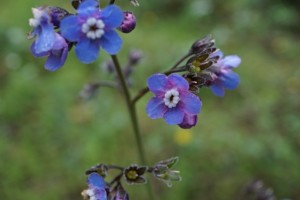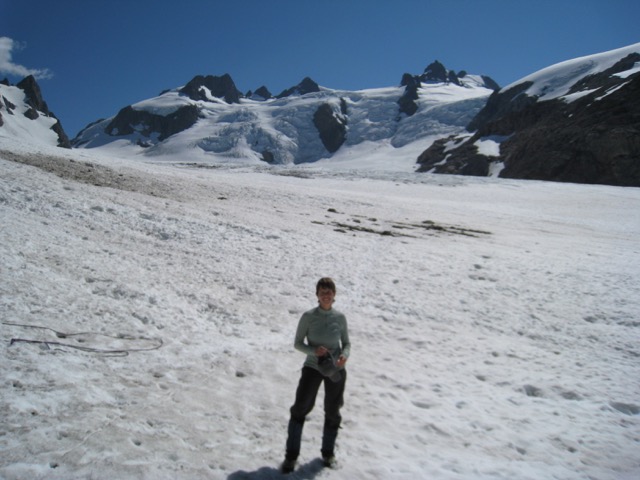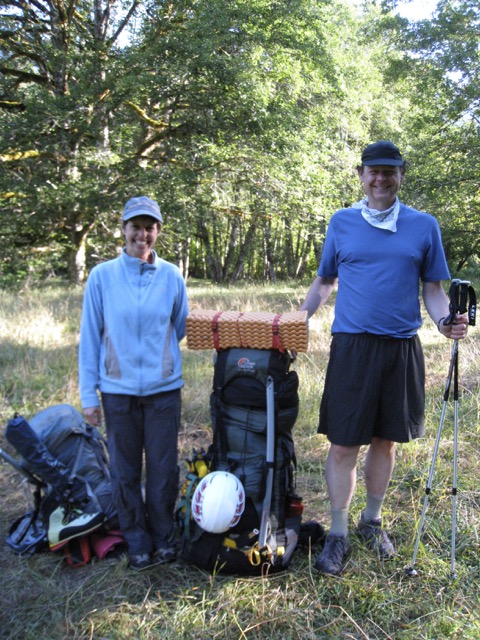On Wednesday this week, my friend and I made our way to Henry Coe State Park to see the wildflowers. The rain had pummeled our area for several days, and the morning of March 9th dawned cloudy, misty and drizzly. Despite the bleak weather, we did not lose heart. Instead, bringing with us enough rain gear to make a New Zealand explorer feel sanguine (and leaving dry shoes and socks in the car), we waded out into the water-logged Coe wilderness.
The hills, as Julie Andrews could have sung, were alive with the sound of damp greenness. Light rain fell on us when we passed beneath the sopping leaves of trees. The trail led us up through the clouds, and though I knew the view stretched miles to the south, we could not see farther than a few feet of the slope below us.
In the meadow above Monument Trail, a few irises radiated their gentle purple-blue leaves like a three-pronged compass, looking fragile and battered and wet. A glorious perfume wafted from the just-opening flowers of the madrone; its red trunk, as yet smooth and un-peeling, looked fresh and bloody after the rain. Farther up, shooting stars, lupine and Indian warriors covered the sides of the road, colorful against the fertile brown-green background of the slippery-slopey trail.
Down below Frog Lake, a fork of Coyote Creek blocked our way, the water flowing clear and cold over the trail. We took off our shoes and waded, barefoot, to the other side. We climbed, exhilarated by damp, muddy feet, the 0.2 miles to the lake. Expanding wave-rings in the water and a “plop” gave the only hint of frogs jumping into the lake one by one, like a tumbling line of invisible dominoes. My friend had brought a birthday picnic: egg and avocado sandwiches, baby bell peppers and cucumber spears, roasted chestnuts, chocolate, bananas and tangerines. A feast. We dug in, hungry already, not minding the cold, wet ground.
The trail back to the visitor center led us up in a gentle slope through meadows of wildflowers, under oak trees, and through a low manzanita forest. On a hillside, I sought out the elusive purple mouse ears. I’d heard this tiny flower grew on Corral Trail on one of the grassy slopes, but I had never seen it. On this trip, however, like a nature birthday gift, we found several of them hiding in between the grasses, all purply and fat, their ears laying wet and heavy close to their heads as they stared at us above their crown of chubby, light-green leaves.
Driving home, now in unforeseen sunshine, I thought of my expectations for this birthday and my hope that I will celebrate, for once, a happy day. I thought about the purple mouse ears, about the frogs diving into the lake, and the other wildflowers, abundant as they came alive, so ephemeral, with the rain. Next February, as our year to live winds down, these flowers will be but a memory, pictures in the mind’s eye, but together with this last birthday they will have left a pleasant, treasured feeling in my heart.
At home, Dar arranged gifts on our dining table. Yet another surprise. A huge bouquet of flowers towered above wrapped boxes for me and the kids. I look at it now and the impermanence of all around me strikes me hard. This bouquet with its bold colors looks so solid and real, but in the next few days the flowers will begin to fade and die. They too, as Stephen Levine says in his book, began to die on the day their seeds were put in the womb of the ground. I long to take a picture of the flowers and restrain myself. Let them be, I whisper to myself, and let them, peacefully, easefully, naturally, die.




